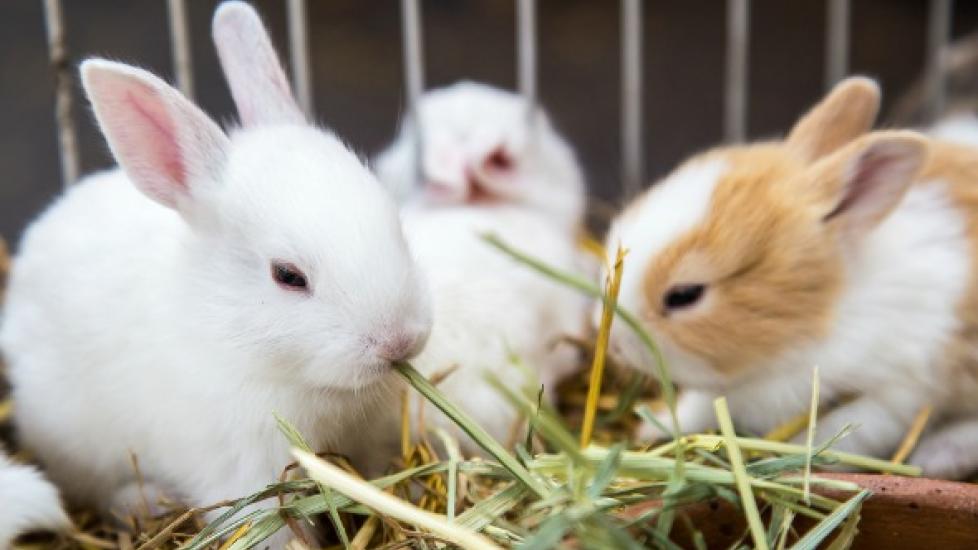Rabbit Fun Facts
By Joe Cortez
In southeastern Native American folklore, rabbits are often considered "tricksters," perhaps for their mischievous and sometimes confusing behaviors they demonstrate during play. In addition to their nicknames, new rabbit owners will likely have many questions about their new companions, including what to call a baby rabbit and how to tell the difference between a boy rabbit and a girl rabbit. Learn the answers to the most frequently asked rabbit questions here.
How many rabbit breeds are there in the world?
Rabbits come in all different shapes and sizes, each with a distinct personality of their own. “There are nearly 50 breeds of domestic rabbits, with many sizes, shapes and colors represented among them,” said Dr. Jen Quammen, master of public health and veterinarian at Grants Lick Veterinary Hospital in Butler, Kentucky. Additionally, some breeds have more distinguishable traits than others. The Lionhead is known for its large mane, while Dutch rabbits are known for their black-and-white color pattern.
Recommended Products
What do you call a baby rabbit?
Not to be confused with cats, a baby rabbit is called a "kit" or "kitten." Consequently, a mother rabbit will have a litter of kittens when it gives birth and can have up to 14 kittens in a litter. Litter size depends on breed, with smaller rabbits having four or five kits per litter and larger rabbits having between eight and twelve kits per litter. The smallest litter on record is one kit and the largest is 18 kits!
What is a male rabbit called?
Borrowing a term from another woodland creature, a male rabbit is known as a "buck." Despite the name, an un-neutered male rabbit will not rut when they are interested in mating, instead, they may sniff, lick, nuzzle, tail-flag and spray to express their interest in a female.
What is a female rabbit called?
Although a female rabbit may be colloquially known as a “bunny,” the technical term for a female rabbit is a “doe,” and an adult rabbit may also be called a “coney.” While a female rabbit may be identified as a doe at birth, it typically doesn't reach maturity until nearly a year old. A rabbit’s maturity age depends on breed. Small rabbits can reach maturity around four or five months, while medium-sized rabbits reach maturity between four and six months and large rabbits reach maturity between five and eight months. Does mature earlier than bucks.
How can I tell if my rabbit is male or female?
Unlike other animals, male and female rabbits may not have major difference in appearances. The only sure way to tell if your rabbit is male or female is to examine their genitals.
Female rabbits will have a very distinct appearance to their genitals, almost protruding from their body. “In female rabbits, there is a v-shaped or mountaintop appearance,” Quammen said. “From the side, it can look like a pyramid and it will be sticking up or out somewhat.” Male rabbits are recognizable by two oblong testicles, which appear above their genitalia.
For those trying to determine the sex of a kit younger than four months, Dr. Christine Kabalan of East Hilliard Veterinary Services in Hilliard, Ohio, suggests applying gentle pressure to the point from where they urinate. If your rabbit is male, the penis would extrude out, she said. Testicles descend in a male rabbit around 12 weeks of age.
What sounds do rabbits make?
According to Kabalan, rabbits make three distinct types of sounds, each describing a different emotion. The noises range from grunts, to thumps and even a purring-type sound.
One of the most common sounds your rabbit will make is a grunt. "Grunting is an attention seeking behavior," Kabalan said. "It means they are excited or eager, or if a male is intact and wants to mate." Grunting is also a sign of agitation, or a “back off” warning to other rabbits or people, and can be followed by scratching or biting. Rabbits grunt when they feel threatened or to show disapproval.
When a rabbit is content with life, they may "purr" by clicking their teeth together. However, Kabalan advises this should not be confused with teeth grinding or chattering, which can be a sign of pain or illness.
When a rabbit is unhappy or is alerted to potential danger, they will make a "thump" sound. "Thumping is where a rabbit takes a back foot and thumps it on the ground," Kabalan said. "They do this when they are disapproving of the situation." Rabbits also thump when they are afraid or nervous. In the wild, they thump to let the other rabbits of the warren know that there is a predator or danger present.
A rabbit will only make outward noises if they are in pain or terrified. If a rabbit begins squealing or screaming, seek medical attention immediately, as it means the rabbit is in crisis.
Why does my rabbit shake its head and make funny jumps?
Rabbits are not shy about expressing their emotions, with one of their most prominent being happiness. They show their joy by dancing in the air and performing what is called a "binky."
"Binky is an expression of extreme happiness," Kabalan said. "They jump in the air and twist their head and body in opposite directions either standing in one place or while running."
Although this behavior may be concerning for a new rabbit owner, this is actually a very good sign. When a rabbit binkies, it means they are happy and content in their home.
While their behaviors and personalities may be complex, knowing how to understand your rabbit is a strong start to a long lasting relationship. By understanding these basic facts about rabbits, you are on your way to a long and loving bond with your new furry friend.
Image: Russamee / Shutterstock




